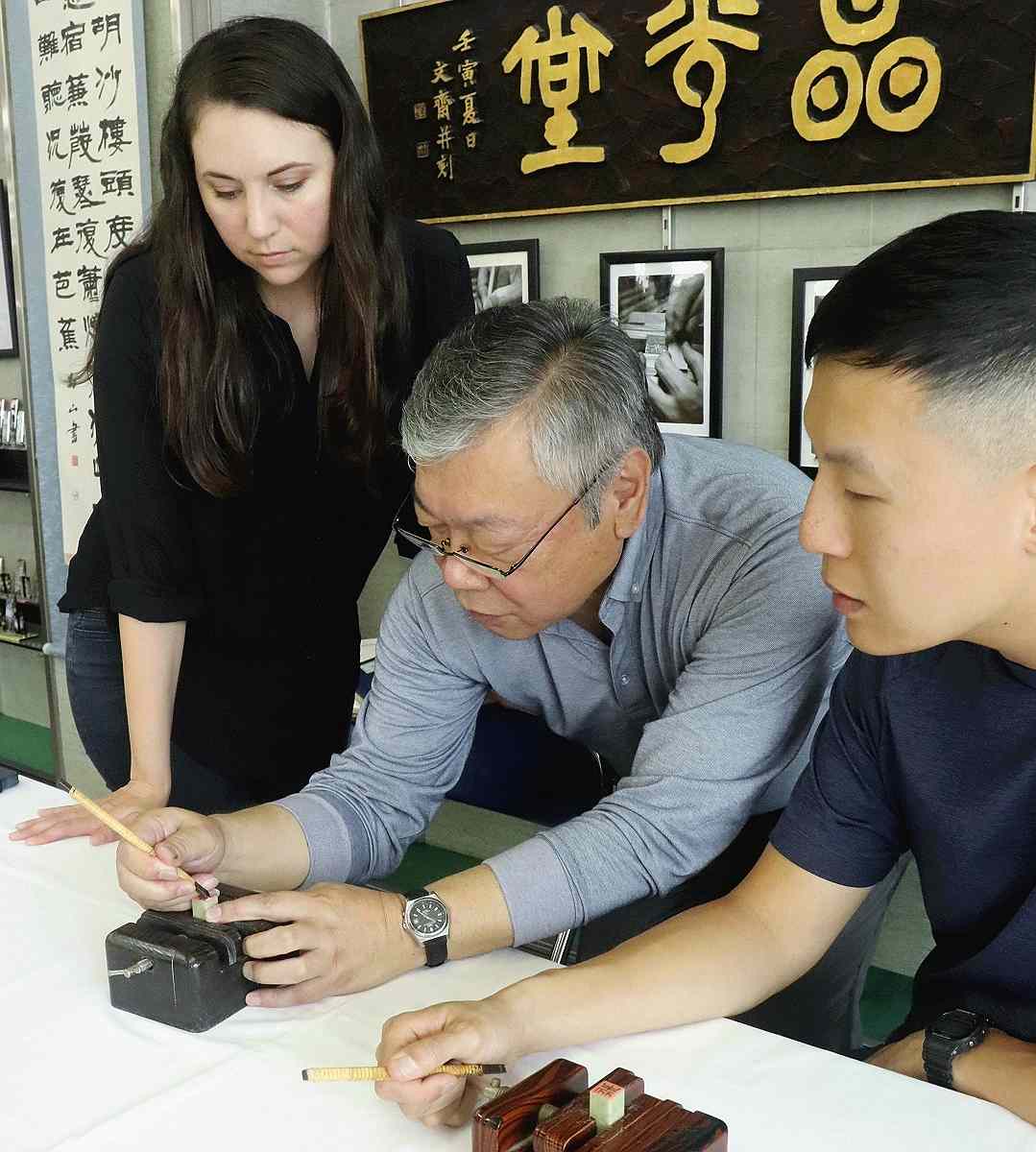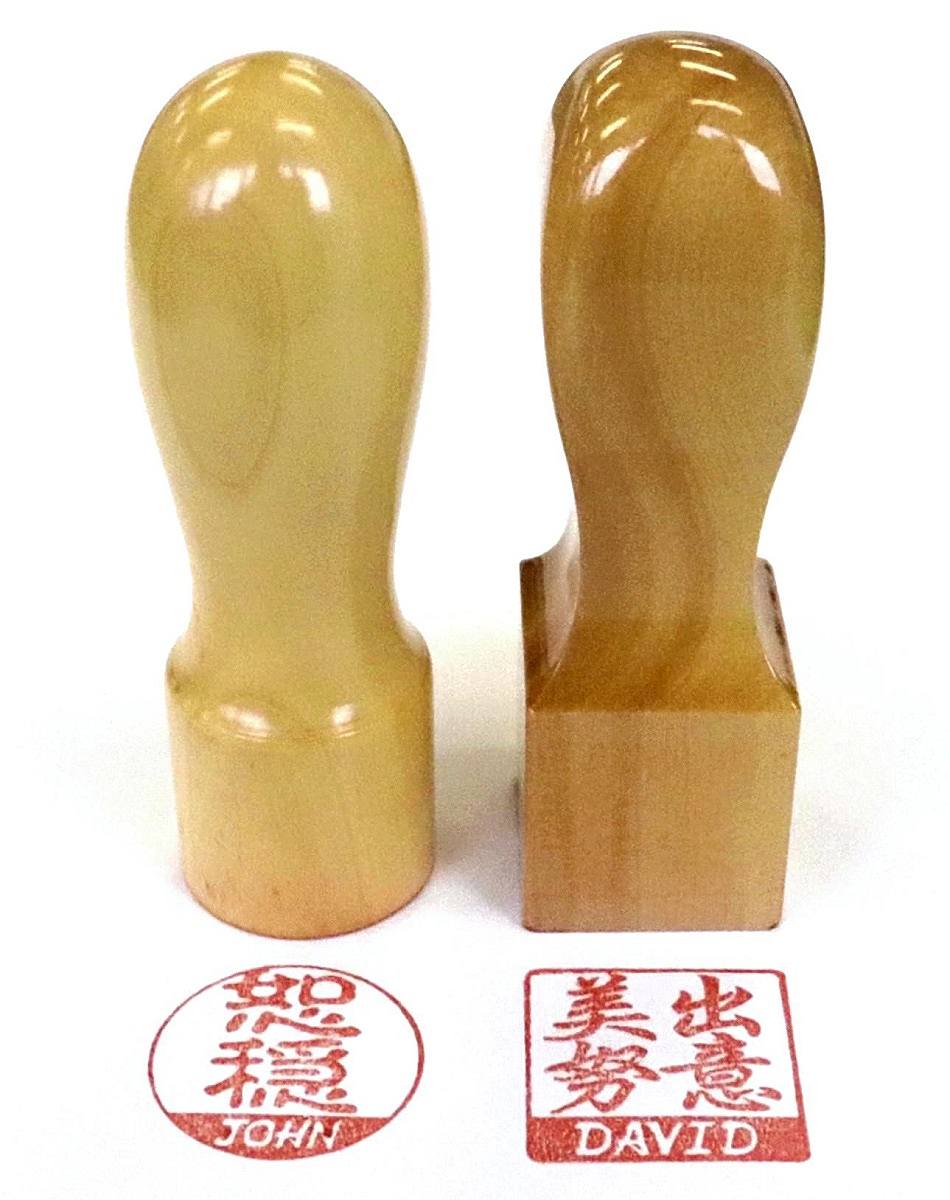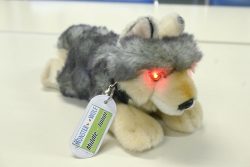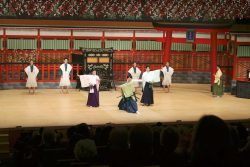
Foreign tourists visiting Japan, including Michael Sai, right, learn how to carve a hanko seal from a craftsman, center, in June in Ichikawa-Misato, Yamanashi Prefecture.
1:00 JST, July 27, 2023
With Japan’s centuries-old culture of using hanko seals to stamp documents in decline due to digitization, some companies that make the items are offering foreign customers one-of-a-kind hanko, such as ones bearing phonetic renderings of their names in meaningful kanji characters.
The products are popular both on e-commerce websites and among tourists visiting Japan, who buy them as cool souvenirs.
One such hanko seal was made for a person named Shannon, written in two kanji characters that read “sha” and “non.” The kanji mean “thank” and “warmth,” respectively.
Another name, Hanadi, is written in two kanji characters pronounced “hana” (“beautiful as a flower”) and “dei” (“mud”), intending to convey the idiom-like meaning of “lotus flower blooming out of mud.”
These are examples from about 200 order forms received online from overseas and kept by Harada Shokodo Co., a long-established hanko seal company in the town of Ichikawa-Misato, Yamanashi Prefecture. The town calls itself “the largest production base of hanko seals in Japan.”
The company’s president, Hiroshi Harada, 57, explains the popularity of personalized seals: “I feel people overseas want to get a hanko to have something that is uniquely their own, like getting a tattoo.”
Some foreign tourists visit the company while sightseeing. Each time, a craftsperson of the company explains the meaning of potential kanji characters while referring to a dictionary.
Michael Sai, 35, an American doctor, chose a kanji pronounced “sai,” which is also a common Japanese surname, for his hanko. He also had a hands-on experience in carving it himself.
He said that he felt the craftsmanship and history of hanko seals. He also said that he wants to stamp his letters with his hanko to make them look special.
The hanko seal industry has been on the decline mainly due to the computerization of administrative and corporate procedures that had traditionally required hanko to complete.
The value of shipments by hanko seal companies with four or more employees was ¥22.1 billion in 2020, only about 60% of the value 20 years ago, according to the Economy, Trade and Industry Ministry.
In Ichikawa-Misato’s Rokugo area, formerly a separate town, the business of making hanko seals from Yamanashi Prefecture rock crystal flourished during the Meiji era (1868-1912). A local hanko seal business association that had more than 100 members around the 1980s has only about 30 now.
Harada Shokodo, in business for more than a century, has also seen a decline in sales.
In 2018, in search of new markets, the company participated in a sales meeting for Japanese merchandise in California. The company made a hanko seal bearing the kanji characters for “kinniku” (meaning muscle) for a bodybuilder and “sensei damashii” (teacher’s guts) for a teacher. When it explained to visitors that such hanko seals can function as “an original logo” for each person, they sold like hotcakes.
In 2021, the company created an English version of its sales website and promoted the product on social media. Then, it started receiving orders from overseas — sometimes more than 100 a month.
“We were able to show there are overseas markets for hanko seals. We want to continue our business without fearing the changes of the times,” Harada said.
Kanji and Roman letters

A “dual hanko” seal bearing both kanji characters and Roman letters
Bunbukudo Inbo Co., a hanko seal shop in Shinagawa Ward, Tokyo, sells “dual hanko” seals, in which a name is engraved in both kanji characters and Roman letters to make it easier for foreign people to understand how to pronounce the kanji.
A hanko seal for David, for example, is written in four kanji letters that have the sounds “de,” “i,” “bi,” and “do,” respectively, along with “DAVID” written in Roman letters.
Due to the product’s popularity, the company receives visits from foreign tourists every day.
Each customer selects kanji for their hanko seals from a catalog of kanji that lists their pronunciations and English translations. Each stamp is completed in about an hour.
The product has become a topic of conversation as a cool souvenir unique to Japan. More and more Japanese people and Japanese companies also order them as souvenirs and mementos for foreign visitors.
With the COVID-19 pandemic having subsided at least for now, expectations are high for a further increase in the number of foreign visitors to Japan.
Shop operator Fumikazu Matsuzaki, 64, is currently studying English conversation to better serve customers.
“I want to take all possible measures to seize new business opportunities,” he said with enthusiasm.
Top Articles in Society
-

Producer Behind Pop Group XG Arrested for Cocaine Possession
-

Man Infected with Measles Reportedly Dined at Restaurant in Tokyo Station
-

Man Infected with Measles May Have Come in Contact with Many People in Tokyo, Went to Store, Restaurant Around When Symptoms Emerged
-

Woman with Measles Visited Hospital in Tokyo Multiple Times Before Being Diagnosed with Disease
-

Australian Woman Dies After Mishap on Ski Lift in Nagano Prefecture
JN ACCESS RANKING
-

Producer Behind Pop Group XG Arrested for Cocaine Possession
-

Japan PM Takaichi’s Cabinet Resigns en Masse
-

Man Infected with Measles Reportedly Dined at Restaurant in Tokyo Station
-

Israeli Ambassador to Japan Speaks about Japan’s Role in the Reconstruction of Gaza
-

Videos Plagiarized, Reposted with False Subtitles Claiming ‘Ryukyu Belongs to China’; Anti-China False Information Also Posted in Japan






















